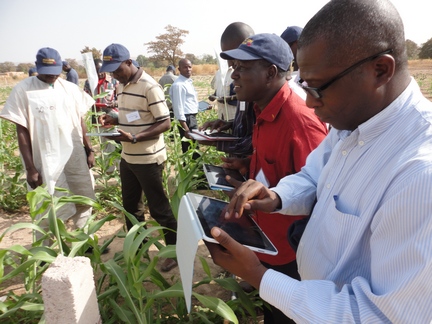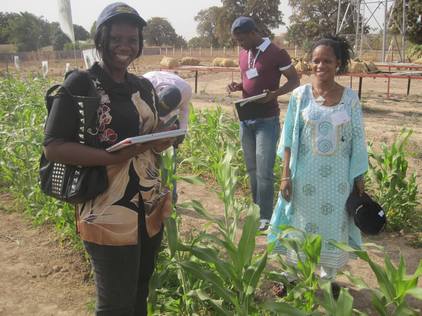Today, we chit-chat with Arllet Portugal (pictured) on crop research data management. Arllet’s greatest daily challenge is convincing crop breeders and other crop researchers that their research data are just as important as their core research work. She also educates us on what she means by ‘SHARP’ data management. But first, a little background on Arllet…
Transitions, travels and tools
Plant breeding is in Arllet Portugal’s blood. Her father (now retired), one of the original field staff of the International Rice Research Institute (IRRI) at Los Baños in The Philippines, nurtured it in her from a tender age. It’s easy to picture him sharing fascinating tales daily with his family upon coming home, after a day of hard work in sun-splashed paddies where he nurtured mysterious and exotic new lines of rice which he was told may hold the solution to world hunger.
“He loved what IRRI stood for and admired the research they did,” reminisces Arllet. “I think he hoped one day he would have a son or daughter working alongside the researchers, so I guess I fulfilled that wish!” She adds “His IRRI stories still continue to this day, and I have learnt much from him which continues to give me deeper insights in my work and interactions with crop scientists.”
Having lived most of her life under the canopy of IRRI, including 12 years working as a database administrator at the Institute, she decided it was time for a change, and she spread her wings – an adventure that would take her across the oceans, pose new challenges, and plunge her deeper into agricultural research beyond IRRI’s mandate crop, rice. So, in 2009, she packed her bags and headed to Mexico, having accepted a position as a crop informatician for wheat at the International Maize and Wheat Improvement Center (CIMMYT), and then moving over to GCP the following year as Informatics Coordinator, and later on Data Management Leader of GCP’s Integrated Breeding Platform (IBP).
The Platform is a one-stop shop for crop information, informatics tools and services designed to propagate and support the application of modern approaches to crop breeding, particularly targeting developing countries.
We are trying to show breeders that their ‘system’ can be enhanced and streamlined if they enter data straight into a computer when they’re in the field and then upload them into an online database.”
Gunning for a digital data revolution: The challenge of changing mindsets
Arllet’s greatest daily challenge is convincing crop breeders and other crop researchers that their research data are just as important as their core research work, and they should therefore dedicate as much time, energy and resources to managing data.
“Like everyone else, most plant breeders tend to be generally comfortable with the ‘systems’ that they and their predecessors have always used,” says Arllet. “For plant scientists, this often consists of recording results using pen and paper when they are out in the field, then coming back to their office and either filing those paper records as is, or re-entering the data into a basic Excel spreadsheet that is for their eyes only. They will then pull these data out when they want to compare them with their previous data.”
Arllet explains that this age-old system is not necessarily wrong, but it wastes valuable time, is insecure and limits the capacity of breeders to efficaciously reuse and also share their data with colleagues – a practice by which they would help each others’ work. “We are trying to show breeders that their ‘system’ can be enhanced and streamlined if they enter data straight into a computer when they’re in the field and then upload them into an online database,” she says.
Walking with giants…”
Dealing with data: maximising efficiency, security, value and sharing
“These data can then be better secured and managed for their benefit and that of other researchers doing similar or related work, in essence increasing their working capacity. They would also have access to the most current analytical tools to verify their results and do their research more efficiently.”
Arllet explains that such improved systems have been in place for decades in the developed world, particularly within the private sector but not as prevalent in the developing world or public sector. This is largely attributable to the high cost of the equipment and informatics tools, and a lack of personnel with the appropriate skills to make use of the tools.
Through a collaborative effort bringing together a wide array of partners, with funding primarily from the Bill & Melinda Gates Foundation, supplemented by the European Commission and the United Kingdom’s Department for International Development, IBP is working to overcome some of these barriers. With the release of the Integrated Breeding (IB) FieldBook, the foundational informatics tool for the proposed system, Arllet believes a giant step has been made towards achieving this objective.
Breeders will be able to use it to plan their trials from start to finish”
What is the IB FieldBook?
The IB FieldBook is a user-friendly computer program that facilitates the design of field trials and produces electronic field-books, field plans and labels. It collects together – in a single application – all the basic tools that a plant breeder requires for these diverse but intertwined functions.
“Breeders will be able to use it to plan their trials from start to finish,” says Arllet. “This is important as it will, for example, keep track of all the identities of plant crosses, minimising the chance that the breeder, or assisting technician, will record the data incorrectly, while emphasising the importance of accurate data for correct crop-breeding decisions.”

Live demonstration: Taking the tablet through the paces at a training workshop for research technicians in January 2012. The regional workshop for West Africa (in French and English) was hosted by L’Institut d’économie rurale (IER) at Sotuba, Mali. A similar workshop was held in Ethiopia in English for the Eastern and Southern Africa region.
She and her team have been conducting training workshops on data management for breeders at which they demonstrate the IB FieldBook and the use of handheld electronic devices (such as tablets) for data collection, which breeders can conveniently take to the field with them and directly enter the phenotyping data they would normally capture in paper field-books.
Tablets and feedback
“The training has been challenging but fun,” says Arllet. “When we present the breeders with a tablet at the start of the exercise, they get really excited. It takes a while for them to learn how to use it, but once they do, they see how this technology could save them time and reduce the risk of mistakes. It’s a little sad for them and for us though when we have to take the tablets back at the end of the exercise, as demand always outstrips supply. We have however distributed around 200 tablets to breeders, university academic staff, researchers and postgraduate students of plant breeding. Majority of the recipients are from Africa and Asia. And the good news is that, as a result, some of the institutes and programmes the recipients come from have gone ahead to purchase more units for themselves.”
Arllet observes that the workshops have not only allowed her team to educate breeders and build awareness, but also to receive valuable feedback on how the IB FieldBook could be improved to make it even better, and learn what other tools breeders need. “Based on this feedback, we worked on the IB FieldBook version 4, which was released in June 2013, as well as on a number phenotypic and genotypic data management tools to incorporate into both the FieldBook and the primary crop databases.”
‘SHARP’ data – shareable, available, reusable and preservable.

Left to right: Diarah Guindo (IER), Ardaly Abdou Ousseini (L’Institut national de la recherche agronomique du Niger, INRAN) and Aoua Maiga (IER) at the January 2012 training at IER Sotuba, Mali.
SHARP and secure data management
Plant breeders are collaborating more often than they used to, and also drawing much more on specialised experts for each stage of the crop variety development chain. These experts are able to verify the data to make sure they are correct, do their job quickly and pass the data onto the next expert, an economical resource- and time-efficient process. However, as Arllet explains, consistent and secure data management is key to the success of these collaborations.
For Arllet, data that are properly managed are ‘SHARP’ – shareable, available, reusable and preservable. “By collecting data in a consistent format, uploading them to a secure database with easily identifiable tags, and making them available to other researchers, the data will be more accessible to partners, enable reliable analysis and conclusions, be more likely to be reused, and most importantly, save time and money. For example, breeders who share their data on the IBP database will receive support from researchers outside of their own breeding programme and enlist the help of experts and specialists they require for particular tasks,” says Arllet. “This includes access to, say, a molecular biologist in Europe or Asia for the breeder in Africa or America who may need that kind of specialist help, for example.”
Arllet and her team of four consultants are currently helping breeders from all around the world upload their historical research data into the central crop databases of the Integrated Breeding Platform, a massive task given the issues of trust, language barriers, slow internet connections, inadequate computer skills and the sheer volumes of the data. However, these are challenges that are becoming easier to handle with greater awareness and the enthusiasm that comes with that.
What next, and what difference will it make?
Adoption and broad use of the FieldBook will of course also make the process easier in the future, enabling a single step uploading of phenotypic data – hence setting breeders free to get on with their work without the wastefulness of having to enter and re-check the data multiple times.
“What it all means is that we will facilitate the more rapid and efficient development of higher-yielding more stress-tolerant crops that can benefit the farmers and the people they feed,” says Arllet, “and that is the ultimate goal of a plant breeder’s work.”
Links
- ‘Dosing’ the digital divide: A tablet for that field-to-desk headache
- BLOGPOST: A new breed of workbench – Introducing the Breeding Management System
- Access the Breeding Management System (registration required)
- A nuts-and-bolts approach to capacity building
See videos below: ‘ Masses of crop breeding information: How can it be handled?’ and “Why use IBP’s breeding and data management tools?“, which, in the view of one of our Australian partners, explains why IBP is particularly important for developing countries, and why they have a comparative advantage compared to the developed world.
Next video below:
PRIZE AND FUN! If you’ve survived this far, you deserve a prize, in the form of seeing Ms Portugal in party mode. To see what Arllet gets up to when she’s not crunching data, flip through this fun album








